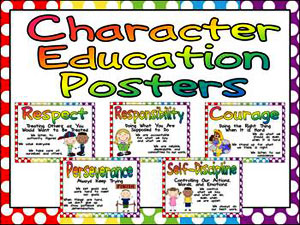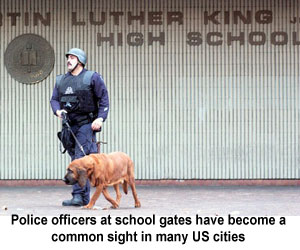
Police in Pittsburgh have arrested a 16-year old teenager for the suspected stabbing of 21 fellow students

FRONT PAGE
About us
 

Character education
America jails its youth
Youth curfews in US cities
Rehabilitation of ex-felons in the US
US teachers face scrutiny
Character education
US school discipline & civil rights
US education 2042
US school reforms
US mayors and schools
US college degrees
US public school integration
US military schools
US mayors fight inequality
USA racial profiling
US mayors fight against guns
US gun contol in tatters
US debates use of marijuana
Vision for metro America
Non-profits vital to urban USA
Nonprofits versus US cities
Catholic Church in urban USA
Poverty in US cities
US school reforms
US urban inequality
US clergy and local politics

Worldwide | Elections | North America | Latin America | Europe | Asia | Africa |


 




 













|
|
US mayors look to education
in response to school violence
By Tony Favro, USA Fellow
16 April 2014: The 16-year-old boy who on 9 April 2014 stabbed and slashed 21 of his fellow students in a school near Pittsburgh, Pennsylvania, will be tried as an adult. Law enforcement officials have no choice; the law requires the young offender to be accorded adult status. The response to repeated incidents of school violence in the United States over the past 20 years has led to ‘hard’ solutions, such as reducing the age at which youth must be tried as adults; posting police officers at schools; expanding the death penalty to juveniles; and making bullying a crime. Simultaneously, with much less fanfare, another type of response has been growing quietly. Public schools in at least 30 states now promote ‘character education’ as an anecdote to safety concerns, as well as troubling issues like teen pregnancy, truancy, and poor academic performance.
• Character education
• From Aristotle to American mayors
• Universal values
 Character education Character education
Character education is a movement to create curricula and schools that instill positive values in students. For example, North Carolina’s Student Citizen Act of 2001 requires every public school district in the state to “develop and implement character education instruction with input from the local community… to address the following traits: courage, good judgment, integrity, kindness, perseverance, respect, responsibility, self-discipline.” California’s State Education Code stipulates that, “Each teacher shall endeavor to impress upon the minds of the pupils the principles of morality, truth, justice, patriotism, and a true comprehension of the rights, duties, and dignity of American citizenship, and the meaning of equality and human dignity, including the promotion of harmonious relations, kindness toward domestic pets and the humane treatment of living creatures, to teach them to avoid idleness, profanity, and falsehood, and to instruct them in manners and morals and the principles of a free government.”
Character education is not limited to the US. The final report of the independent Riots Communities and Victims Panel, appointed following rioting in British cities in 2011, recommends further study of character education for British schools, citing its “strong potential… to help children build resilience and self-confidence as part of normal school life.” Centers which study character education exist in universities and think tanks in the US and UK.
The assumptions behind character education are, first, that there are universal values that we all share, and, second, that such values can be taught to children in a systematic way. Studies of character education in the US find mixed results. Mostly, they point to the importance of a comprehensive approach to developing positive character traits in youth: integration of character education into curricula from pre-school through high school; availability of adult role models and mentors both in and out of school; positive school, home, and neighborhood environments; access to adequate guidance, counseling, and social services.
What remains unexamined is the idea of ‘universal’ values. Issues such as abortion, homosexuality, and racial and economic inequality test notions of shared virtues and common values. Public schools in America now strive to educate for a common core of grade-appropriate knowledge in mathematics and reading. Can they - should they - also strive to educate for the common good?
 From Aristotle to American mayors From Aristotle to American mayors
The idea that moral character is a cornerstone of education and civic life has long been part of American thought.
President George Washington wrote in 1790 that “good moral character is the first essential in a man, and that the habits contracted at [a young] age are generally indelible. It is therefore highly important that you should endeavor not only to be learned but virtuous."
When Alexis de Tocqueville came to America in 1831, he was impressed by the religious faith exhibited by the Americans he met and connected it to democratic governance, concluding that “a free society must teach men to govern themselves, and there is no greater inducement to self-restraint than belief in God.” In other words, a despot can force his subjects to bend to his will, but people in a democracy must be bound together by something larger, which de Tocqueville identified as the core virtues which a Christian God bestows on all of humanity.
Washington and de Tocqueville were channeling a strain of thought that ran through the Enlightenment to Aristotle. Aristotle wrote that people of all ages and from all quarters of a city should be educated together in the core virtues necessary to living well together. Such public moral education would ensure civic cooperation, mutual support, informed judgment, and sound decision making on issues of public concern.
Current US mayors extend the tradition. In April, in Chicago, the National League of Cities sponsored an event advertised as “Big Ideas for Cities’’, which featured discussions and best practices from the mayors of Gary, Indiana, Philadelphia, Portland, Salt Lake City, and other American cities.
Philadelphia Mayor Michael Nutter made the connection between adequate public education for youth and ending the violence that makes homicide the leading cause of death for young Black men. Mayor Chris Coleman of St. Paul, Minnesota told participants that, “Education happens all the time, and is about developing children’s whole character, helping them become resilient and believe that hard work will make them smarter.
“I reject the notion that mayors don’t control education” because they don’t control the school district, Coleman continued, giving examples of innovative programs for youth in St. Paul community centers and neighborhoods that help young men and women “find the inner strength they never knew they could have.”
Still, what can and should be taught about character in a pluralistic society? What happens when social and economic equality don’t coincide with equality under the law? When citizenship is linked to employment status? When one’s own good doesn’t mesh with the common good?
 Universal values Universal values
Character education may seem to be a matter of common sense: there are simply some traits that we all intuitively know we must have if our lives are to go well and we are to fulfill our potential, and, conversely, when our lives do not go well, we often identify the lack of one or more of these traits as the reason why - character traits like courage, honesty, and self-restraint; that is, essentially, the moral teachings of all great religions, as well as secular philosophers like Aristotle.
However, we live in a world where common sense is ridiculed as a serious explanation of human interactions, and the word ‘moral’ is often a flash point for cultural and religious controversy. Common sense or morality or character is considered flabby unless bolstered by statistics and hard, numerical data. Character may be a point of departure for discussion, but, ultimately, we look to science for a point of reference, a foundation, and authority - especially when it comes to allocating government resources for public services like education.
Scientists are beginning to measure what humans actually need and value. Empirical research is demonstrating that people, across cultures and age groups and for both genders, have three fundamental needs. They feel they must be able contribute to their communities; they must have close relationships beyond their families; and they must be able to autonomously pursue their personal interests if their lives are to go well. These needs are more important to people than wealth or fame or good looks. It’s called Self Determination Theory, and it’s as close to measuring universal values as we’ve ever come.
Basically, scientists have taken theories of justice, parsed them into empirically testable claims, and found that people from various life experiences converge on a short list of values that they identify as crucial to their existence.
Scientists have looked at education, health care, sports, psychotherapy, and environmental sustainability through the lens of self-determination theory. Research is showing that policies and programs that take these universal values into account are more successful than those that don't. And it's not hard to conclude that mayors and other leaders who can attend to these deep human needs will likely accrue significant political capital, and therefore it is in their interest to create an environment conducive to them.
The implications are far reaching, not least because they seem to challenge evolutionary theory’s premises of constant competition and survival of the fittest. It appears eminently possible to provide curricular and non-curricular education—indeed, to redesign, implement, and evaluate entire institutions—by taking into account what all humans actually need. And American cities and their educational systems would stand to benefit most.
|
|

|

































